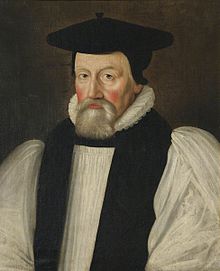Thomas Morton | |
|---|---|
| Bishop of Durham | |
 Portrait by Simon Luttichuys | |
| Diocese | Diocese of Durham |
| In office | 1632–1646 (Episcopacy abolished)[1] |
| Predecessor | John Howson |
| Successor | Vacant (Civil War) |
| Other post(s) | Dean of Gloucester (June 1607–1609) Dean of Winchester (1609–1616) Bishop of Chester (1616–1619) Bishop of Coventry & Lichfield (February 1619–1632) |
| Orders | |
| Ordination | 1594 |
| Consecration | 1616 |
| Personal details | |
| Born | 20 March 1564 |
| Died | 20 September 1659 (aged 95) Easton Maudit, Northamptonshire, England |
| Buried | Easton Maudit parish church |
| Nationality | English |
| Denomination | Anglican |
| Residence | Richard Morton & Elizabeth née Leedale |
| Spouse | never married |
| Alma mater | St John's College, Cambridge |
Thomas Morton (20 March 1564 – 20 September 1659) was an English churchman, bishop of several dioceses. Well-connected and in favour with James I, he was also a significant polemical writer against Roman Catholic views. He rose to become Bishop of Durham, but despite a record of sympathetic treatment of Puritans as a diocesan, and underlying Calvinist beliefs shown in the Gagg controversy, his royalism saw him descend into poverty under the Commonwealth.
- ^ King, Peter (July 1968), "The Episcopate during the Civil Wars, 1642–1649", The English Historical Review, 83 (328), Oxford University Press: 523–537, doi:10.1093/ehr/lxxxiii.cccxxviii.523, JSTOR 564164